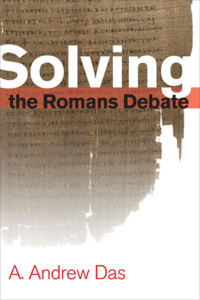
Scholars have long debated the “double character” of Romans. Why did Paul address a long discussion of Jewish themes to a gentile audience? A. Andrew Das promises to resolve the debate through a fresh understanding of the identity and attitudes of the gentile Christians in Rome and of the expulsion of Jews from Rome under the emperor Claudius. His reading offers new insight into Paul’s concern for the Jewish roots of the Christ movement.
Endorsements:
Andrew Das’ Solving the Romans Debate powerfully and cogently argues a solution … that makes perennial problems vanish and that produces a credible coherence that has been lacking in the Romans debate. All of those who are serious about that debate must read this book.
– Stanley Stowers, Brown University
Das makes a strong case that in Romans Paul was writing to an exclusively gentile audience. Using both evidence from the letter and from historical sources, Das demonstrates his conviction that gentiles are the focus of Paul’s concern and proposes that this makes sense of the letter’s focus on the Jewish heritage that accompanies faith in Christ. The gentiles to whom Paul was writing were facing an identity crisis and Paul is seeking to incorporate them into the rich heritage that accompanies faith in Christ. This book is an important and stimulating contribution to the ongoing Romans debate.
– L. Ann Jervis, Trinity College, University of Toronto
Book Details:
ISBN-10: 0800638603
ISBN-13: 978-0800638603
Release Date: January 1, 2007
Reviews:
- Review of Biblical Literature (2008) – Don Garlington
- Review of Biblical Literature (2007) – David J. Downs
- Catholic Biblical Quarterly (2008) – Mary Ann Getty
- Word and World (2008) – Kyle Thomas Fever
- Theological Studies (2008) – Karl P. Donfried
- Interpretation (2008) – James C. Miller
- Journal for the Study of the New Testament (2008) – Peter Oakes
- Toronto Journal of Theology (2008) – Tony Costa
- Koinonia (2007) – Matthew V. Novenson
- Horizons in Biblical Theology (2007) – Johann D. Kim
- Logia – Peter J. Scaer